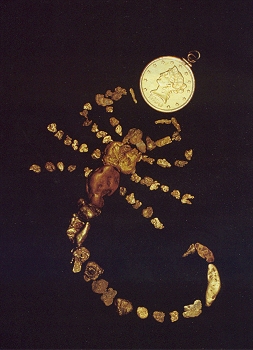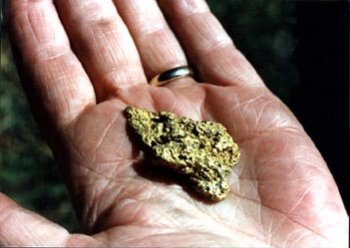By Richard Doherty
“With the new instruments available today, millions of gold nuggets are within reach of the intelligent, properly equipped, electronic prospector.”
 When I first heard about picking gold nuggets from the surface, or close to the surface of the ground, I really didn’t think it was feasible.
When I first heard about picking gold nuggets from the surface, or close to the surface of the ground, I really didn’t think it was feasible.
I made some halfhearted attempts at locating some of the precious yellow beauties with no success and much frustration. Finally, I buried a gold nugget down in the ground and attempted to locate it with my new detector. To my surprise, it wouldn’t detect the nugget, so I moved it closer to the surface and still couldn’t detect the target. It was almost on the surface by the time I was able to receive a very light audible signal. That did it! I quit!
Still, the idea of locating a gold nugget with an instrument really intrigued me, so I stayed in touch with the advances of metal detectors. In the meantime, I continued my more conventional prospecting activities in Arizona, where I was fortunate enough to associate with other prospectors who knew about gold deposition.
Years later, the metal detector industry began to develop detectors that would deal, at least somewhat, with the highly-mineralized ground associated with gold deposits. So I purchased one of the most advanced detectors on the market and went in hot pursuit of the elusive yellow nuggets. Hour after hour, I combed the ground; I searched everywhere the gold “had to be!” If it was there, I wasn’t finding it, so I pressed on.
 Finally, after many, many frustrating hours, the first nugget succumbed to my detector, minutes later, another. I really got excited, and I decided to share this new-found activity with my friends. I helped them learn what I had learned, and then we developed new methods and techniques. Detectors were getting better, and I purchased the latest equipment, knowing that I needed every edge that I could possibly acquire.
Finally, after many, many frustrating hours, the first nugget succumbed to my detector, minutes later, another. I really got excited, and I decided to share this new-found activity with my friends. I helped them learn what I had learned, and then we developed new methods and techniques. Detectors were getting better, and I purchased the latest equipment, knowing that I needed every edge that I could possibly acquire.
We sorted out which instruments worked best and figured out how to get the most from the ones we decided to work with. Nuggets began to fall on a regular basis, and more friends became interested. We turned them on to the equipment we were using and the techniques we had developed. They began to find gold nuggets almost immediately. This surprised me; because after all the heartache I went through to locate my first nugget, my friends were quick to pick up what we had already learned.
Gold nugget hunting is not like coin hunting at all; it is a specialized field and requires specialized equipment and techniques. Once learned, it is easy. As you do it more and more, nuggets will yield to your detector more consistently.
First, there are three “musts” for any degree of success. Not one of them is any more or any less important than the others, because they are dependent upon each other:
2. Knowledge regarding the use of your instrument must be thorough.
3. Knowledge about where the gold is located. Most of this information is gathered through research and talking with others who already know.
Your degree of success depends upon how diligently each one of these three “musts” is followed, and it is that simple. If you decide to approach finding gold nuggets in this manner, it is not a matter of, “Will I find a gold nugget?” It is only a matter of when, how big, and how many!
 It has never before been more possible to locate your own gold nuggets with the aid of a metal detector, than it is right now. It is not that there is more gold out there. In fact, each day, there is a little less. However, with the new instruments available today, millions upon millions of beautiful gold nuggets are now within easy reach of the intelligent, properly-equipped electronic prospector. You don’t need tons of equipment to haul around, nor do you need many thousands of dollars to get started. The exercise is mild; the air is fresh; and the pursuit of your own gold nuggets is done at your pace — no one else’s.
It has never before been more possible to locate your own gold nuggets with the aid of a metal detector, than it is right now. It is not that there is more gold out there. In fact, each day, there is a little less. However, with the new instruments available today, millions upon millions of beautiful gold nuggets are now within easy reach of the intelligent, properly-equipped electronic prospector. You don’t need tons of equipment to haul around, nor do you need many thousands of dollars to get started. The exercise is mild; the air is fresh; and the pursuit of your own gold nuggets is done at your pace — no one else’s.
I would also like to mention some of the myths surrounding electronic prospecting. It is difficult to place these in any order, so I will just mention them according to the frequency of times I am asked:
“Are there still gold nuggets out there to be found?”
“Will a metal detector really find gold?”
“Didn’t the ‘old-timers’ get all the gold?”
“Why isn’t everybody doing it?”
“Isn’t all the land claimed up?”
“Don’t I need a specialized vehicle or mode of transportation to get to the gold?”
“Isn’t it hard work?”
“How can I find gold nuggets when I know nothing about geology, mining, mineralog, or electronics?”
“Won’t a detector find fool’s gold?”
Please don’t let these questions, objections or myths stop you from gathering your own gold. It’s a whole new exciting, profitable activity, and you can do it!
Public awareness is definitely on the increase, and hundreds are getting into the activity of capturing gold nuggets from the earth. There are pounds of gold being taken daily, and there is no reason why you cannot be taking your share!
Frustration and lack of confidence is the primary cause of failure. The reason most electronic prospectors fail is that they purchase inadequate equipment or don’t learn how to use it properly.
Hunting coins and hunting nuggets with a detector are quite different. Coins are a flat-sided target. Many nuggets are not. Also, many flat nuggets will slip sideways into a crack or crevice in the bedrock, which leaves very little target-area available from the surface. Shape, size, and lack of the “halo” effect can cause a gold nugget to remain a difficult target.
Of course, there are exceptions to this. Not too long ago, I found a 5/8-ounce gold nugget that was about one inch deep, lying flat. It sounded-off like a quarter! I was amazed to retrieve a beautiful nugget which was shaped like an eagle’s head!
Nugget hunters know how important good equipment is. I was speaking with a professional electronic prospector the other day, showing him a new detector. Before I could tell him what the detector cost, he said it didn’t matter anyway; because he was willing to spend any amount of money on the detector if it was significantly better than the one he was using. You see, he knows that good equipment will pay for itself, especially with the price of gold nuggets as they are.
I know coin hunters who dream of finding their first gold coin. Most never do. However, electronic prospectors, who follow the basic guidelines, will find hundreds of gold nuggets.
Where is the gold? This brings us to another reason why now is an excellent time to get started in this fascinating activity. There are clubs and various types of associations which you can join where you will meet other people who prospect. Some of these organizations provide mining properties for their members to prospect. The folks who run clubs are usually quite particular about the mining properties which they own, and they are also knowledgeable about which claims they should stake or purchase. One of the easiest and fastest ways to find gold is to join one of these clubs. Some even provide training programs or organize group mining projects where you can gain immediate, valuable hands-on experience. Talk with other members and the staff to gain information as to where you might begin your prospecting. This is the best way I know of to get started in any type of gold prospecting today.
As you prospect on these claims and talk with others, you will begin to get a “feel” for where the gold is and why it is there. Gold seems to be a lot easier to find if you already know it is there. If you are not sure, it could cause you to search halfheartedly, and that is not conducive for locating nuggets. You must know the gold is there; you must know how to operate your equipment; and you must know that your equipment will get the job done. If you have these three criteria well in hand, you will surely find your own gold. After that, it’s just a matter of spending some time doing it and improving your skills.
In the beginning, it may take you a minute or longer to recover a target you have established; but soon, these targets will be coming out of the ground so quickly that you will surprise yourself. My average recovery time per target is between fifteen and thirty seconds, depending upon digging conditions. I have seen it take as long as 30 minutes to extract a target, but these are more unusual conditions.
In Quartzsite (Arizona) last year, we had occasion to dig in some very old material that was as hard as concrete. This material had been deposited millions of years ago. There was no man-made metal present. But the gold was there! My detector sounded off, and we knew what it was; so we started to excavate. It was hammer and chisel time! You must be very careful not to scar the nugget, so digging has to be carefully-done. Almost 30 minutes later, out came a beauty. It weighed just over ½-ounce. It was detected under 13-inches of highly-mineralized, concreted earth and rock.
As you uncover a valid target, it will usually develop into a clearer signal or stay about the same. If it stays the same, you may also have passed over an area that is highly mineralized. Or perhaps there was some kind of hot fire in that spot during some time in the past. Sometimes, ashes will read very slightly on the detector. But the signal does not develop as you dig down on it.
If the signal disappears altogether, you have either moved the target, or you may have had a piece of rusting ferrous material that fell apart when you moved the soil. A magnet comes in handy to quickly isolate ferrous targets; it can be a real time saver!
Bullets, nails and other foreign metallic targets are some of the items you will learn to deal with. At first, they are nothing but a nuisance. However, let’s take a closer look at this: If you are digging metal of this nature, not only does it hone your recovery skills, but it tells you that the area has not already been searched-out (every smart, responsible detectorist has a container along to remove small metal trash-targets from the playing field).
If there are no previous dig-holes, you may be the first person to detect that area. But if there are dig-holes, and you are still finding metal, it tells you someone else did not do a thorough job. If they left trashy metal in the area because they were using an electronic discrimination mode, they certainly will have left nuggets behind, too! You will pick up the nuggets your predecessor left, because electronic discrimination seldom can be used effectively while nugget hunting. Only under certain conditions would you use discrimination, and that would be after many hours of experience. Even then, you could make costly mistakes. My advice is to not use electronic discrimination while hunting gold nuggets.
Meters, gauges, bells and whistles do not make a good nugget-hunting detector. I personally feel about the only function they serve to the nugget hunter is to add weight to the instrument — which is the last thing you need. Although I will admit that there are other good prospectors around who disagree with my opinion.
The following is a list of recommended reading material which may call for reading and re-reading. This is not a complete list, but the material suggested here is a must:
Willie Merrill wrote a book called, THOSE ELUSIVE NUGGETS; and he not only knows what he is talking about, he shares his knowledge in a very free manner. I have read the book no less than five times. Each time, I learn something new. Our minds are not always ready to accept all information the first or second time through.
Another book of importance is ELECTRONIC PROSPECTING by Roy Lagal and Charles Garrett, which will also require more than one reading. This book goes into the many avenues of electronic prospecting.
Any magazine articles written by successful electronic prospectors are definitely worth reading. Hundreds of articles could be written on the subject of electronic prospecting, and each one of them will have some hot tips for you. .





